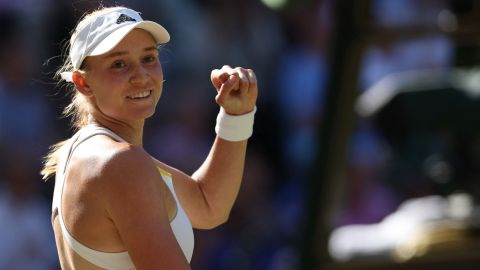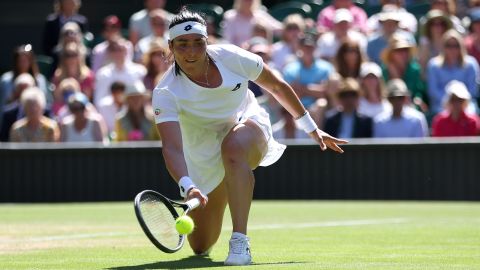CNN
—
Whenever Ons Jabeur steps onto a tennis court, she is never playing just for herself, but for the future generations she hopes to inspire.
This Saturday will be no different as Jabeur attempts to become the first Tunisian, first Arab and first African woman to win a Grand Slam in the Open Era.
“Tunisia is linked to the Arab world, is linked to the African continent,” she told reporters after securing her spot in the Wimbledon final, where she will play against Kazakhstan’s Elena Rybakina, who herself made history.
“We want to see more players in the area. It’s not like in Europe or other countries. I want to see more players from my country, from the Middle East and from Africa.”
Jabeur, 27, was a trailblazer for her region well before reaching Saturday’s final. Last year, she became the first Arab player to win a WTA title and finish in the top 10 in the individual rankings.
However, Saturday’s victory would be the biggest success of her career.
“I’ve often imagined myself giving the speech, holding the (Wimbledon) trophy and seeing the trophy,” Jabeur said.
“I did it all. Now I really have to hold the trophy. That’s all I have left. But I believe in it. I know I can do it.”
Jabeur has enjoyed a steep climb up the world rankings in recent years, breaking into the top 50 for the first time in 2020.
She won her first of three WTA events last year and her next two – in Madrid and Berlin – earlier this season, propelling her to an all-time high of second place in the world.
Her success on the pitch – coupled with her friendly, easy-going demeanor off the field – has made her a hugely popular figure in her native Tunisia, where she is nicknamed the “Minister of Happiness”.
“Sometimes times are hard in Tunisia,” said Jabeur. “When they see my games, they always say sport connects people. I’m glad you follow me. They push me to do better. Hopefully I can keep the title forever.”
READ: Nadal withdraws from Wimbledon due to injury
Jabeur has only lost two sets at this year’s Wimbledon – against Marie Bouzkova in the quarterfinals and Tatjana Maria in the semifinals.
However, the big, powerful Rybakina has dropped just one set and looks set to be Jabeur’s toughest opponent yet after dismantling 2019 Wimbledon champion Simona Halep in their semi-final on Thursday.
No matter who wins, history will be made as when the two clash on Center Court, a first-time Wimbledon champion will be crowned and either Tunisia or Kazakhstan will celebrate their first Grand Slam singles champion.

Rybakina, born and raised in Moscow, moved from Russia to Kazakhstan four years ago – a move that seems particularly relevant at this year’s tournament given Wimbledon organizers’ decision to exclude Russian and Belarusian players amid the ongoing war in Ukraine.
“I’ve been playing for Kazakhstan for a long time,” Rybakina told reporters on Thursday when asked about her nationality.
“I’m really happy to represent Kazakhstan. you believed in me There’s no longer a question of how I feel. It’s just been a long time, my path as a Kazakh player: I’ve played in the Olympics, Fed Cup.”
Like Jabeur, Rybakina is enjoying the best Grand Slam tournament of her career, having never progressed past the quarterfinals before.
The two players have previously faced each other three times, with Jabeur winning twice, including their last meeting in Chicago last year.
Saturday’s final will feature contrasting styles: Jabeur brings a fun array of shots to her game and makes good use of slice and drop shots, while Rybakina brings power – both from the baseline and on her serve.
READ: Three Wimbledon security guards arrested over alleged argument among themselves

The 23-year-old has hit 49 aces so far in this tournament – 19 more than any other player – and recorded the second-fastest serve in the women’s draw at 122mph.
Jabeur is aware of her opponent’s challenges.
“She serves really well, so my main goal is to return as many balls as possible so that she works really hard to win the point,” Jabeur said.
“I’ve played them a couple of times. I know she can hit really hard and beat a lot of winners. I know my game could really bother her. I’m really trying to focus more on myself, doing a lot of slices and trying to make them work really hard.”
But for the so-called ‘minister of happiness’, Saturday’s game will also be about savoring the occasion – a moment Jabeur previously thought she would never experience in her career.
“Overall, I try to have fun playing tennis because sometimes it’s difficult to do when you’re playing every week, when maybe you’re losing every week. It’s really tough.
“But for me I had to remember why I started playing tennis, what kind of joy tennis gives me. As soon as I remember it, I feel pumped and motivated to play my next games.”
